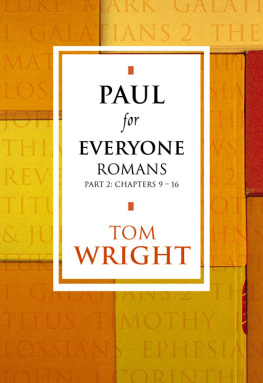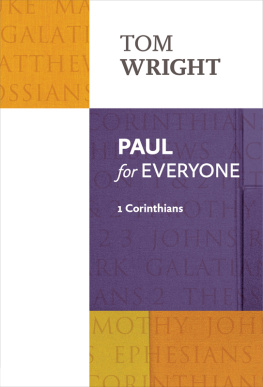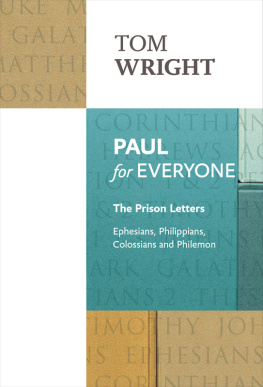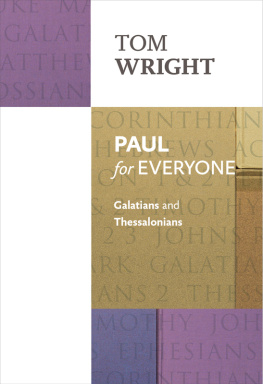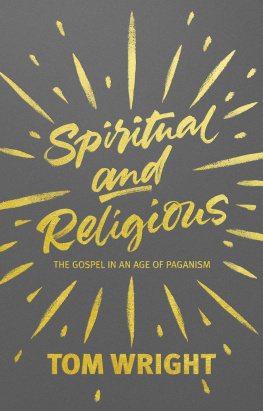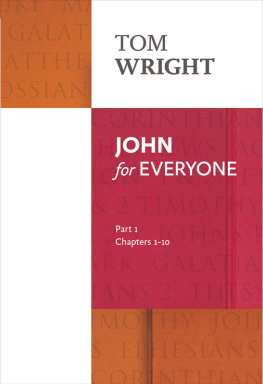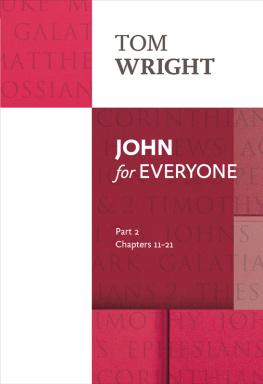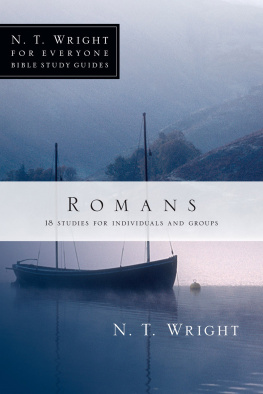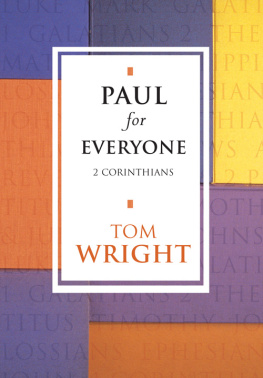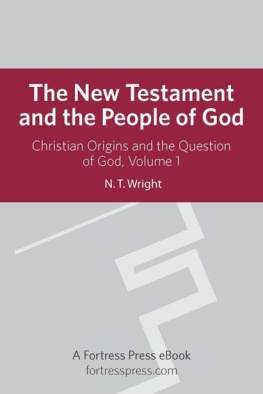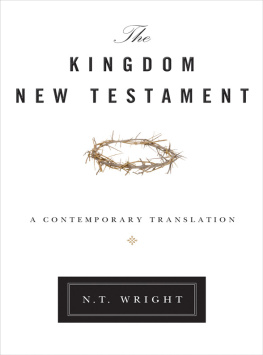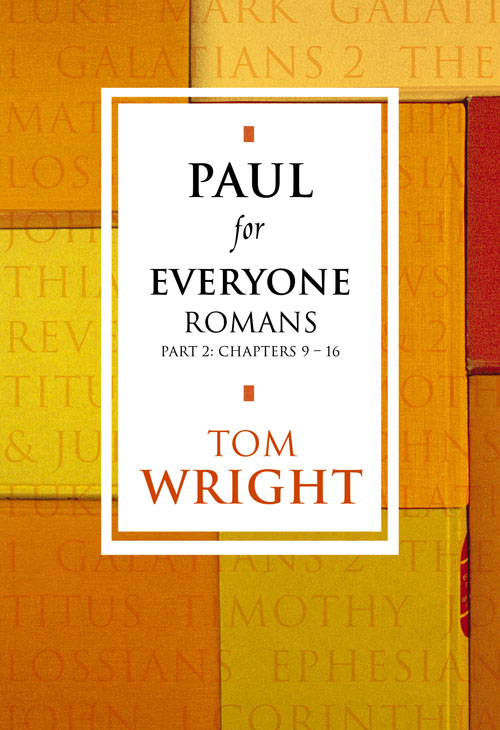
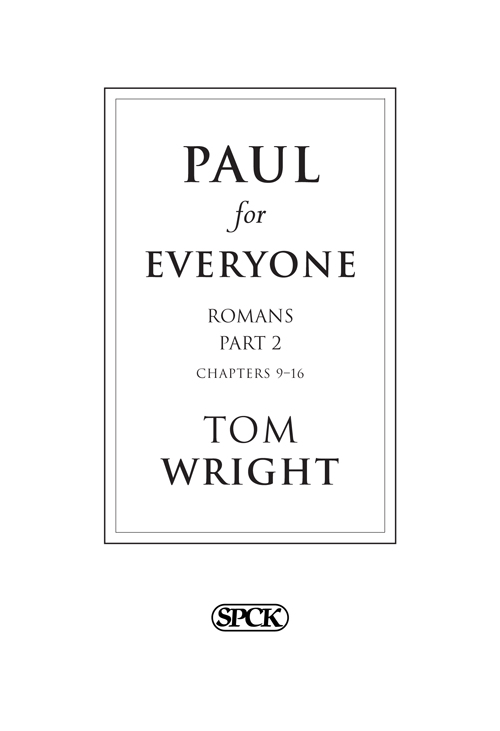
Copyright 2004 Nicholas Thomas Wright
First published in 2004 in Great Britain by
Society for Promoting Christian Knowledge
36 Causton Street
London SW1P 4ST
www.spckpublishing.co.uk
and in the United States of America by
Westminster John Knox Press
100 Witherspoon Street
Louisville, KY 40202
All rights reserved. No part of this book may be reproduced or transmitted in any form or by any means, electronic or mechanical, including photocopying, recording, or by any information storage and retrieval system, without permission in writing from the Society for Promoting Christian Knowledge, 36 Causton Street, London SW1P 4ST.
12 13 10 9 8 7 6 5 4 3
British Library Cataloguing-in-Publication Data
A catalogue record for this book is available from the British Library.
ISBN: 9780281057375 (U.K. edition)
United States Library of Congress Cataloging-in-Publication Data is on file at the Library of Congress, Washington, D.C.
ISBN: 9780664229122 (U.S. edition)
E-ISBN: 9780281062751
Typeset by Pioneer Associates, Perthshire
Printed in Great Britain by Ashford Colour Press
Produced on paper from sustainable forests
eBook by Graphicraft Limited, Hong Kong
CONTENTS
For
Hattie
In all these things we are completely victorious through the one who loved us
Romans 8.37
On the very first occasion when someone stood up in public to tell people about Jesus, he made it very clear: this message is for everyone .
It was a great day sometimes called the birthday of the church. The great wind of Gods spirit had swept through Jesus followers and filled them with a new joy and a sense of Gods presence and power. Their leader, Peter, who only a few weeks before had been crying like a baby because hed lied and cursed and denied even knowing Jesus, found himself on his feet explaining to a huge crowd that something had happened which had changed the world for ever. What God had done for him, Peter, he was beginning to do for the whole world: new life , forgiveness, new hope and power were opening up like spring flowers after a long winter. A new age had begun in which the living God was going to do new things in the world beginning then and there with the individuals who were listening to him. This promise is for you , he said, and for your children, and for everyone who is far away (Acts 2.39). It wasnt just for the person standing next to you. It was for everyone.
Within a remarkably short time this came true to such an extent that the young movement spread throughout much of the known world. And one way in which the everyone promise worked out was through the writings of the early Christian leaders. These short works mostly letters and stories about Jesus were widely circulated and eagerly read. They were never intended for either a religious or intellectual elite. From the very beginning they were meant for everyone.
That is as true today as it was then. Of course, it matters that some people give time and care to the historical evidence , the meaning of the original words (the early Christians wrote in Greek), and the exact and particular force of what different writers were saying about God, Jesus, the world and themselves . This series is based quite closely on that sort of work. But the point of it all is that the message can get out to everyone, especially to people who wouldnt normally read a book with footnotes and Greek words in it. Thats the sort of person for whom these books are written. And thats why theres a glossary, in the back, of the key words that you cant really get along without, with a simple description of what they mean. Whenever you see a word in bold type in the text, you can go to the back and remind yourself whats going on.
There are of course many translations of the New Testament available today. The one I offer here is designed for the same kind of reader: one who mightnt necessarily understand the more formal, sometimes even ponderous, tones of some of the standard ones. I have tried, naturally, to keep as close to the original as I can. But my main aim has been to be sure that the words can speak not just to some people, but to everyone .
Pauls letter to the Christians in Rome is his masterpiece. It covers many different topics from many different angles, bringing them all together into a fast-moving and compelling line of thought. Reading it sometimes feels like being swept along in a small boat on a swirling, bubbling river. We need to hold on tight if were going to stay on board. But if we do, the energy and excitement of it all is unbeatable. The reason is obvious: because Romans is all about the God who, as Paul says, unveils his power and grace through the good news about Jesus. And , as Paul insists again and again, this power and grace is available for everyone who believes. So here it is: Romans for everyone!
Tom Wright
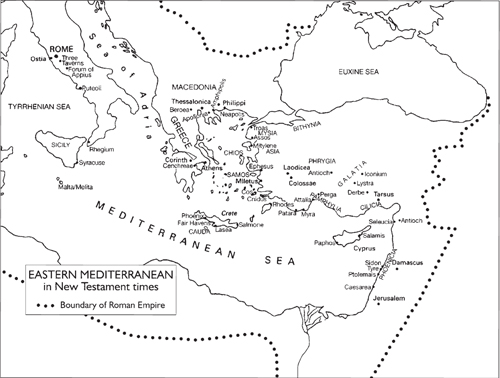

1 Im speaking the truth in the Messiah, Im not lying. I call my conscience as witness, in the Holy Spirit, 2 that I have great sorrow and endless pain in my heart. 3 Left to my own self, I am half inclined to pray that I would be accursed, cut off from the Messiah, on behalf of my own family, my own flesh-and-blood relatives. 4 They are Israelites; the sonship, the glory, the covenants, the giving of the law, the worship and the promises all belong to them. 5 The patriarchs are their ancestors; and it is from them, according to the flesh, that the Messiah has come who is God over all, blessed for ever, Amen!

This mornings newspaper carries a whole page of corre spondence about an ugly fact of modern life: anti-Semitism is on the rise again. Jews have been attacked and threatened , vilified and abused in many cities in our supposedly civilized world. Old lies about the Jews, long since disproved and discredited, have been revived, published and widely circulated . And the letter-writers are asking: could this be because of peoples antipathy, not to Jews as such or their Semitic origins and identity, but to the policies of the present Israeli government? This in turn generates a second level of debate, often as bitter as the first: does opposing the policy of a government mean that you are prejudiced against the nation in question? Are you prejudiced because you criticize, or do you criticize because you are prejudiced? It doesnt take much of an argument like that to make most of us throw up our hands in frustration and change the subject. Meanwhile, hatred and violence continue unchecked on their vicious spiral.
This is where we have to begin if we are going to read the next three chapters with any kind of integrity today. Please note, I do not say that we must let our present debates determine what we are prepared to let Paul say. We are here to listen to him, and ponder the meaning of what he says, not to project on to him either the views we want to hear (so that we can enjoy the echo of our own voices) or the views we dont want to hear (so that we can enjoy telling him off for his wrong-headedness). But no Christian today can ignore the fact that for many centuries anti-Semitism flourished across large areas of Christendom, and the church not only did nothing to prevent it but added fuel to the fire by declaring (for instance) that the Jews killed Jesus, despite the insistence of all four gospels that it was the Romans. Faced with the present passage, which speaks in every line of Gods purposes for Israel, and which proposes a Christian understanding of that difficult and dangerous subject, we must pause and reflect, in sorrow and humility, on how our own faith and scriptures have been abused in support of dangerous prejudices. And we must pray for wisdom to do better.
Next page
